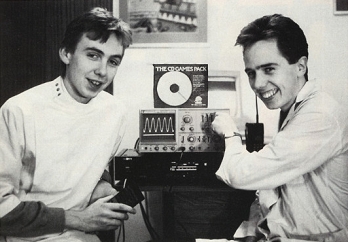Darling Code Masters 
Programming might be one way to earn a living, but if you want to make a real fortune wouldn't you be better ol starting your own software house ? That's what Richard and David Darling did with Code Masters -and haven't they done well ? The software wunderkinder started off programming for Mastertronic. In the space of two years they wrote 20 games and. estimates David Darling, made around £100.000 Their own budget label rapidly acquired a reputation for quality games, and is now worth. David reckons, over a million pounds. And business is still boomin; the recently released Spectrum ver sion of Grand Prix Simulator sow 12.000 copies - on its first day. 
David and Richard - Darlings of the budget industry.
ACE MAGAZINE 1987 | ★ AMSTRAD CPC ★ A voir aussi sur CPCrulez , les sujets suivants pourront vous intéresser... |
CPCrulez[Content Management System] v8.7-desktop/c
Page créée en 505 millisecondes et consultée 3503 foisL'Amstrad CPC est une machine 8 bits à base d'un Z80 à 4MHz. Le premier de la gamme fut le CPC 464 en 1984, équipé d'un lecteur de cassettes intégré il se plaçait en concurrent du Commodore C64 beaucoup plus compliqué à utiliser et plus cher. Ce fut un réel succès et sorti cette même années le CPC 664 équipé d'un lecteur de disquettes trois pouces intégré. Sa vie fut de courte durée puisqu'en 1985 il fut remplacé par le CPC 6128 qui était plus compact, plus soigné et surtout qui avait 128Ko de RAM au lieu de 64Ko. |
|
|
